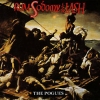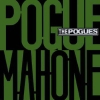THE
POGUES &
SHANE MACGOWAN
Albums
& Stories
Click on an album cover (or just
scroll down) to read the background stories.
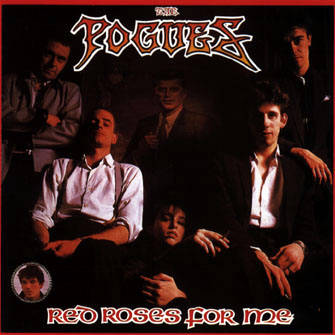
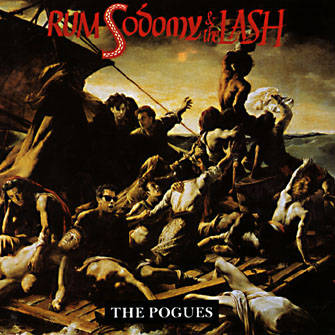
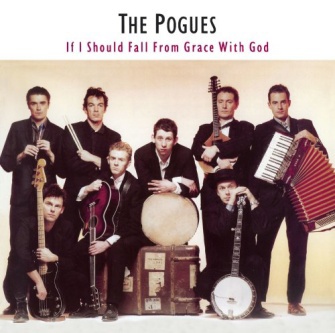
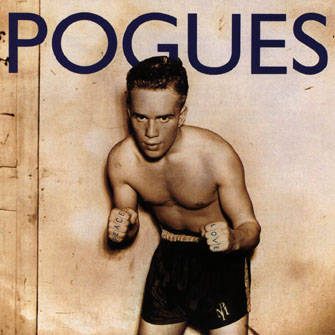
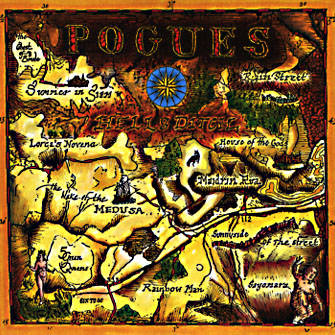
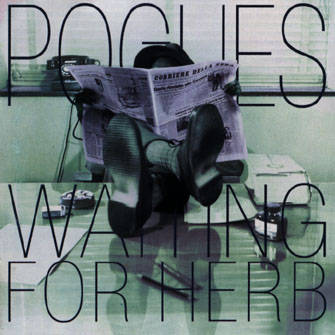
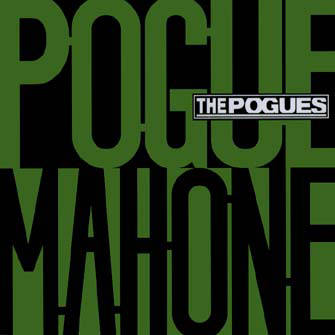
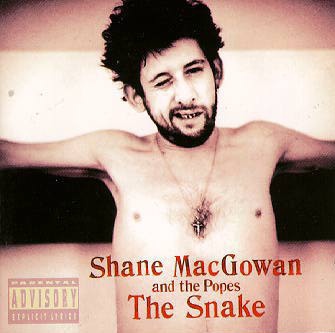
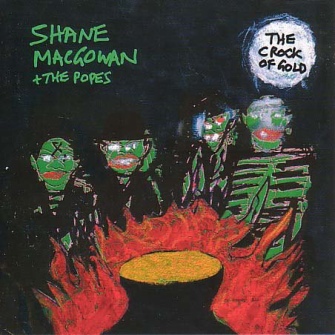
RED
ROSES FOR ME
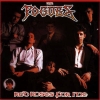
About the cover photo:
Simultaneously, however, they received their first taste of luxury: Stiff splashed out on six pale blue duster coats, tailored to the Wild And Willing tune of 100GBP each. Similar garb had been worn by the notorious James Gang in the Waiter Hill Western 'Long Riders,' and Shane had decided this was perfect stage gear for The Pogues. But when they got round to modeling the coats, in the 'Red Roses For Me' photo-session, MacGowan was looking less than his film star best. He had been involved in a late night collision with three flights of stairs, suffered a broken ankle and now carried a stick. And there were further afflictions: by the time they realized that the front cover photos would have to be re-done, Andrew had disappeared on holiday. A small Ranken mugshot was subsequently slapped beneath the rest of the band.
(from The Lost Decade by Ann Scanlon)
------------------------------------------------------------------------------------------------------------------------------------------------------------------------------
Philip Chevron:
The title was suggested by Andrew Ranken and was, yes, Churchill's quote about the British Navy. All the other subsidiary meanings you have mentioned [a piss up, as in "We’re going out on the lash"] appealed to us as well. An additional one is "the Lash" as in "spirited effort" - a later well known Irish World Cup song exhorted Mr Jack Charlton to "Give it a lash, Jack" for instance.
We had a launch party on board HMS Belfast, moored on the Thames, at which we were piped aboard, from a feeder boat, in the full naval regalia we wear on the cover, and played a short set for the assembled liggers. This took such organisation that by the time we played, all the Rum (the only drink on board, if I recall) had been quaffed by the Melody Maker and NME journalists who then went on to throw each other overboard.
We stayed sober.
(from Pogues.com forum)
Shane MacGowan:
It was just after the launch for Rum, Sodomy and the Lash when we got dressed up in our eighteenth-century pirates’ outfits and came across in a boat at Traitor’s Gate and there was free booze and all the journalists got pissed and one of them fell out of the boat and had to be rescued by the police."
(from A Drink With Shane MacGowan by Victoria Mary Clarke)
Philip Chevron:
I came in half way through Rum, Sodomy And The Lash so I have a peculiar relationship with it. As an album it was really the point where all this expected greatness of Shane MacGowan as a songwriter, came to fruition. Shane allowed his songwriting to define the record pretty much. That was an essential.
With Costello producing, it was also interesting. You know he was producing the album while at the same time falling in love with The Pogues’ bass player. So there was all that energy going on. It made for a positive environment. That’s not to say there wasn’t tension. Elvis’s vision of what The Pogues should sound like wasn’t always the same as The Pogues’ vision. I think though why Elvis was right for the job at the time was because he recognised that the best way to do it was to record the band live with minimal production. His view was to get the performances out of the band. It’s kind of extraordinarily un-produced in its sound but that’s exactly why. He didn’t impose any production shit or gimmicks on it. He just got the right performances out of the band.
(from an interview for Hotpress.com, 2004, when RSL was voted the 8th best Irish album of all times by Hotpress readers)
Philip Chevron:
There were not enough songs for "Rum Sodomy" going into the studio. "Gentleman Soldier" and "A Man You Don't Meet Everyday" were teased out later, as was the "2nd version" of "And The Band Played Waltzing Matilda". This is why I had to supervise a separate session to do b sides, resulting in "Whiskey You're The Devil" and "Muirshin Durkin" and why I continued to produce b sides ("The Parting Glass", "A Pistol For Paddy Garcia") throughout the summer.
(from Pogues.com forum)
------------------------------------------------------------------------------------------------------------------------------------------------------------------------------

Terry Woods:
In recording If I Should Fall From Grace With God, the band had really settled in terms of knowing where we were going. Because of record company problems, we actually ended up touring the album before we had recorded it. The problems were such that we even went to record a solo album under my name, as I was the only one not signed to Stiff Records. Through that we came out with what were really demos for the album. So we knew the material inside out really. It was an album that was great fun to record. My memories are definitely of happy times and a lot of fun. Steve Lillywhite’s production really enhanced the record I think. It’s the closest record to capture the real Pogues. I mean I was never totally happy with The Pogues’ records. The band was always much better live and that was never quite captured in the studio. If I Should Fall From Grace With God came closest though and in that regard I think it’s the band’s best album.
(from an interview for Hotpress.com, 2004, when IISFFGWG was voted the 15th best Irish album of all times by Hotpress readers)
About the cover photo:
Philip Chevron was in agony. His ulcer had flared up agan, really badly, and he could barely stand. (...) „I woke up one morning and I could hardly get out of bed,“ says Chevron. „I phoned up Frank [Murray, the Pogues manager] and said, ‘I can’t make it to the photo session today.’ He said, ‘If you don’t get to the photo session you’re not on the fucking album sleeve.’ He said, ‘Do whatever it takes, get yourself here and then you can sit down.’ In fact, it’s one of those things that worked in our favour As soon as they knew I needed to sit down for most of the session, the photographer brought in this luggage.“
The luggage was a big, old-fashioned trunk which Philip sat on for the photo shoot, surrounded by the rest of the group, all in black suits, holding their instruments. This would become one of the most famous – and appropriate – images of the Pogues.
„It looked perfect,“ says Chevron. „It spoke of emigrants, although the luggage was there mainly for me to sit on. That’s why it arrived in the first place. Again, the Pogues turn disaster into triumph.“
(from Pogue Mahone – Kiss My Arse: The Story Of The Pogues by Carol Clerk, p. 300)
------------------------------------------------------------------------------------------------------------------------------------------------------------------------------
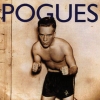
Philip Chevron:
The band was going through a very volatile period at the time. People were having domestic issues and other things were happening to people and people's families. Daryl and I witnessed The Hillsborough Disaster, there was a hundred issues feeding in. A lot of things came into the blend that made things very difficult, and off course Shane started taking a lot of acid at that time, which is no great secret. That changed things because we constantly had to work around his state of mind. So for the next album (Peace And Love) we said lets 'publish and be dammed' - we were unhappy so lets tell people we were.
(from an interview published at Shanemacgowan.com)
Shane MacGowan:
But I still say half of Peace and Love is all right. The production is sort of… fenced in… but like half of it’s all right. The half I wrote!
(from A Drink With Shane MacGowan by Victoria Mary Clarke)
Philip Chevron:
I did the running order of IISFFGWG, though it seems to have been retrospectively attributed to Kirsty and was, in any event, mangled by the Brothers Warner in their vandalistic positioning of the bonus tracks on the CD version. On Peace and Love, I had a lengthy and testy telephone argument in the middle of the night with Brother Rob Dicken, after which I just stayed the hell out of it. In both senses of the word. Dicken, clearly disappointed that the album had no FoNY moment, chose to take the view that "Lorelei" and/or "Blue Heaven" had somehow elbowed out a superior MacGowan song, which may well have been the line Mac fed him, or at least implied. Rob Dicken never did get to learn just how close he came to having to explain away "Contact Yourself" to the elder Brothers. (Just for the record, Shane supplied no other songs for Peace And Love, and I have argued strongly elsewhere that songs like "Pinned Down" should not have been excised from Hell's Ditch, but by that point, I appear to have been effectively removed from the selection process, by accident or design.)
(from Pogues.com forum)
Philip Chevron:
Steve's [Lillywhite's] work on Peace & Love sounds "murkier" because he had a murkier, more tour-weary band to work with. There is a great deal of blurring of various people's shortcomings going on. In that respect, his work is a triumph, though I think Steve would be the first to admit he was not a little murky himself in those days.
We took the view that our fans, if not the wider world, would rather hear us yelping in pain than not at all, so....publish and be damned, we said. And we were, though I am always mindful of the fact that David Bowie's most outstanding though deeply unhappy albums (Diamond Dogs, David Live, Young Americans, Station To Station) all sound like car crashes.
(from Pogues.com forum)
Philip Chevron:
Shane's vocals were mostly pretty weak, despite Lillywhite's best efforts. He was forced to disguise this by doubling up the vocal on various tracks with me or Andrew or Spider. Then it sort of became the sound of the album, so we did it with the other tracks too.
By the way, Steve now considers this a mistake and feels he should have left Shane's feeble vocals exposed but honest. I tend to agree with him.
(from Pogues.com forum)
Steve Lillywhite (the producer of Peace & Love):
I think MacGowan’s voice had become weaker. I made a mistake with Peace And Love in mixing his voice quietly, which made a weak vocal worse. If I’d turned it up, I could’ve made a weak vocal better. I should apologise to him for that. I feel it could’ve been a much better album if the vocals, even if they were weak, had been louder in the mix. Quite often he would slur his voice a lot, so I would actually move the voice forwards in the track. Now you can do it really easily. In those days, it was quite a big job. I did that on a couple of tracks to try and get his voice more in the right place.
(from Pogue Mahone – Kiss My Arse: The Story Of The Pogues by Carol Clerk)
Philip Chevron:
It has to be said that Shane - indeed, the whole band - was in better shape when we recorded the demos than when we cut the album. By then, disillusion, not to mention various drug cocktails, had set in. We gave Lillywhite an uphill battle from the very beginning. Steve probably made the best choices he could at the time in respect of how to disguise/flatter/enhance/obscure the lead vocals, but he is, I think, right to concede, 20 years later, that there was probably a better way around the problem. Oddly enough, with success there appears to come some unspoken additional pressure from the record company to make records a certain way, with a particular sound etc, and in the event, Steve was trying to make the record as much for the Brothers Warner in the UK and Island Records in the USA as for The Pogues. In an ideal world, these are not incompatible goals, as the previous album proves, but I think this one collapsed as under the weight of expectation as much as it suffered from our own flawed humanity, and it ended up representing the best interests of no one.
Amazing it's still a great album, however flawed. What else was there that month, the new Rick Astley?
(from Pogues.com forum)
Philip Chevron:
There is a pastoral/urban conflict taking place that is more defined on Hell's Ditch, though it's potentially more interesting musically on Peace And Love.
In our own different ways, the whole band, and especially the writers, had some strong impulse or other to respond to the Australian outback and the southern States of the USA, both of which had featured if not prominently than at least indelibly in our lives in the previous year. It was always striking to me how major economic powers go to such lengths to hide their "underclasses" from the wider, watching world, something which Hurricane Katrina, for example, blew the lid off only one year ago.
I think we carried these ideas around for quite a while before recording the songs they inspired or sparked or initiated. Which was good for us and not so good for Steve Lillywhite. There isn't really any way you can really get your idea of New Orleans/Good v New Orleans/Bad across to the record's producer if he has not shared the experience with you. Nor can you adequately give him a retrospective stage pass to him for that ONE show when the infant and sparse "Blue Heaven" just locked in and sounded absolutely right. [Schloss Furnace, Birmingham, Alabama]. I felt I knew what the "journey" in "Cotton Fields" and "USA" was and played them that way.
(from Pogues.com forum)
About the cover photo:
Finally then Shane, why did you put a picture of a boxer on the cover of an album called Peace And Love?
Shane Macgowan: "Nobody seems to know who it is. He obviously wasn't very good cause he didn't get very far (laughs). I like boxin', watchin' it I don't like doin' it! But anyway somebody, I forget who, found this glass negative of this boxer with no name and we put peace and love on his fists. So he's like sayin' Peace And Love or I'll bust your fuckin' head in. " (laughs)
(from 'I Drink Therefore I Am', HotPress.com, 1989 published at MacRua’s site)
Philip Chevron:
I'm a bit foggy on the details, but I think Simon Ryan, our designer, got the picture from a photo library. The guy turned out to be a Scot, by then elderly, but still alive and apparently not greatly chuffed by his new fame.
(from Pogues.com forum)
------------------------------------------------------------------------------------------------------------------------------------------------------------------------------
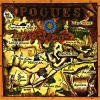
Philip Chevron:
1990 was a World Cup summer. We decamped to the Welsh countryside, to Rockfield, a residential studio where some of my favourite albums (including Horslips' "Dancehall Sweethearts" and Dave Edmunds' "Subtle As A Flying Mallet") had been recorded in the 1970s.
The last 4 years had been exciting but exhausting - we needed to slow down and just be a band, without all the outside pressures. We would watch the football, make music and generally just be together, miles away from the bright lights of Newport! Joe Strummer was, as ever, asked to come along at almost the last minute, something he was getting used to by then!
I know it's not everyone's favourite Pogues album, but personally I have mostly warm feelings about "Hell's Ditch". It is our least intense album, reflecting how we needed to be after the craziness of the past few years. Shane arrived from London infrequently although, in the songs he brought, it was very clear that he too had felt the need to get away from it all, in Thailand.
"Hell's Ditch" is our most pastoral record and contains, incidentally, the most number of Shane songs that have been covered by other people.
The football was pretty good too.
(from Shanemacgowan.com forum)
Philip Chevron:
There is a more relaxed air about it [than about Peace And Love]. There is a more pastoral and country theme about it. Shane had been to Thailand trying to sort himself out. We recorded the album literally in the country in Wales. We stayed together miles away from anybody. So there is a pastoral theme, almost like that Sixties Hippy thing - getting your head together in the country. The whole album was like trying to find the light again. It is called Hell's Ditch because that is kind of where we were jammed into and we were looking to the 'Sunnyside Of The Street'.
(from an interview published at Shanemacgowan.com)
Philip Chevron:
There was a period - quite a lengthy period - when Thailand was Shane's sanctuary of choice between tours, yes. A great deal of Hell's Ditch reflects that, but what makes it such a Poguesy record, in its own right, is that pretty much all of us in the band, in one way or another, were seeking a form of sanctuary from the increasingly bewitched bothered and bewildered life in which we found ourselves apparently trapped. Shane just expressed it better, both more eloquently and more universally, than the rest of us. I always felt the title was hugely ironic - if we had already acknowledged our drive through Hades, we now found ourselves with our axel in Hades' Rut. Spending time together, with only the wild and lovely Welsh countryside around Rockfield Studios for company, the album is in some ways a cleansing process, a sort of Pogues detox. It was, of course, only a temporary respite, but it was brilliant while it lasted. The summer of 1990, the Welsh sunshine, great food, good friends, Ireland in the World Cup, all this and Joe Strummer too. Hell's Ditch is the last really good Pogues record. Clearly, it is a world away from the angst of Peace And Love ,it's almost pastoral, so on that score alone, it's a success.
(from Pogues.com forum)
Shane MacGowan:
On Hell’s Ditch I couldn’t write any Irish stuff. I just wasn’t in the mood, and they wanted an album, you know. So I wrote some rock. And you know I don’t like straight rock, so I put some Spanish influences in it. 'Summer In Siam' and stuff like that.
(from A Drink With Shane MacGowan by Victoria Mary Clarke)
Shane MacGowan:
On Hell's Ditch, I didn't take hardly any interest at all, apart from being dragged off the floor in front of a mike. I had a laugh... but they rejected all the best songs.
(from Friends of Shane Newsletter,1994, published at Pogues.com)
Shane MacGowan:
"I'm musically frustrated because even on this album, where Joe was great and the vibe was great, people couldn't understand what I was doing, where me and Jem were going. There were songs that I wrote that I thought were brilliant and they were kicked off the album. Same with some of Jem's songs. Pinned Down was a great song I wrote. And Jem's song, The Curse Of Love - a country rock masterpiece. Nobody stood up for either of them and there are inferior songs on the LP, real duffers."
Like what?
"No I aint saying but they're there. Same with the last LP. We're both very pissed off, Jem and me."
Why do you think that's happening?
"Cos the rest of them leave a lot to be desired in the imagination department."
(Interview with Shane, Vox magazine, November 1990)
Philip Chevron:
The complaint about the track selection seems to be so commonly held a view within The Pogues that I can't help wondering just who chose the tracks - Frank Murray? Joe Strummer? Warner and his Brothers?
In Shane's case, any opposition to a decision was always against the royal "They". They hated my songs, they wanted to go in this or that direction, they wouldn't let me have my own way... and I still don't know who, specifically, they are or were. Neither, I suspect, does Shane.
(from Pogues.com forum)
Spider Stacy:
Personally, I have always felt Hell's Ditch to be underrated. I think Shane came up with some really strong songs and Joe did a great job. As has been well documented, he had a really tough job getting a vocal performance out of Shane but I don't think any of us were in any great hurry to get it finished. After all it was summer, it was the World Cup and we were in a particularly beautiful part of Wales. I hired a pushbike to get to the nearest pub, which was three miles away...
(from Pogues.com forum)
------------------------------------------------------------------------------------------------------------------------------------------------------------------------------
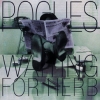
Many thought right away that the "Herb" of the album's title referred to marijuana. Not so, clarified Spider, it's far more socially responsible. It's the name of a German cartoon pornography character.
Spider says he's happy with the album. Explaining the different 'world music' influences, he points to the talented and eclectic tastes of bandmate Jem Finer and the influence of the producer, Michael Brook, and he also points out how that is nothing more than another progression after like moves on the last album, Hell's Ditch.
(from 'Off the Record: Meet the New Boss', Boston Irish Reporter, 1993, published at Pogues.com)
James Fearnley:
To my mind a pretty crap album all round … A lot of it seemed to be characterised, for me, by a sort of troglodytic husbandry in the bowels of some cave by underlings who are undertaking what they think might be the work expected of them by the departed Great One – a sort of hobbit thing without Gandalf, all very worthy but not quite there.
(from Pogue Mahone – Kiss My Arse: The Story Of The Pogues by Carol Clerk)
------------------------------------------------------------------------------------------------------------------------------------------------------------------------------
Philip Chevron:
Side One of Pogue Mahone is one of the most interesting and consistent things the band ever did, whatever the line up.
(from Pogues.com forum)
------------------------------------------------------------------------------------------------------------------------------------------------------------------------------
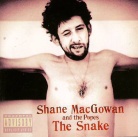
Shane MacGowan:
"Well 'The Snake' was a mess. It was basically a rock album. It was an atrocity - two or three good tracks and the rest of it was rubbish.
(from 'Give 'em enough Pope', NME, 1997, published at ShaneMacGowan.com)
Shane MacGowan:
When the Snake came out, I was ashamed of it. I’m not ashamed of it any more. There’s some great songs on it. And some totally irreverent versions of old Irish songs which I personally find grating to the ear, but I knew would go down very well with headbangers. And that’s great, you know what I mean, it’s a party album. But there’s more to it than that. Like one song has been covered by Christy Moore, ‘Aisling’ one of the serious love songs. And then there’s my other song about you, ‘Victoria’, where we managed to recreate the Thin Lizzy dual guitar sound. I was pretty proud of doing that. I did that. I wrote the song. I conducted them while they played in the studio.
(from A Drink With Shane MacGowan by Victoria Mary Clarke)
------------------------------------------------------------------------------------------------------------------------------------------------------------------------------
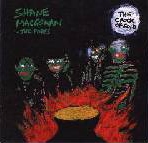
The Crock of Gold, the first album in five years from the former leader of The Pogues and The Popes, takes its title and its themes from James Stephens' novel of the same name. The book traces one man's journey toward happiness and concludes that the heart is the key to it all. Along the way he meets demonic leprechauns who give him directions, both right and wrong. Intellect is eventually subsumed by the whims and desires of the soul. It's one hell of a ride.
Shane MacGowan: "I thought the 'Crock of Gold' was a great title for an album. And the album does have that theme - the crock of gold is in Ireland, not over here. It's not a concept album, but like, but it could be viewed as such... It's a comedy album, really. The songs are mainly comical, it's either light-hearted or funny, there's no heavy stuff on there. The crock of gold is a great sort of legend, and when I was in Ireland, living in the old farmhouse, I thought, hey, I've gone round the world looking for it, but the crock of gold was beneath my feet all the time... That's the main reason I called the album 'Crock of Gold' - because its got a lot of songs about leaving London and going back to Ireland. It's internal - the crock of gold isn't really a crock of gold; it means that at the end of the rainbow there's peace and tranquillity. And the book happens to be one that I really like, a classic of Irish literature, so it sort of fitted in with me calling songs after book titles, like 'Fairytale of New York' or 'Red Roses For Me' or 'More Pricks than Kicks'."
"I wanted to go right back to the roots and start all over again," he says, "back to pure Irish music and simple songs, with lots of humour and lots of emotion and energy and a bit of anger."
"I'm just part of a tradition. 'The Crock Of Gold' is my attempt at covering all aspects of Irishness. People still think there's only one type of Irish music. The album takes you through the whole spectrum. There's ceilidh, showband, punk, rock and roll, traditional .. know what I mean?"
"I'm happy with the album overall," he grins, " Except that it took too long to get it out. Three years of messing about, and then three months to actually do it."
(from '15 Pints of Martini and a bag of crisps, please', Loaded, 1997; 'Shane's Gonna send 'Em Home Sweatin', Irish Post, 1997; 'One more for the road', The Telegraph, 1997; 'Waiting for MacGowan', Rock'n'Reel, 1998, all published at Shanemacgowan.com)
About the cover picture:
Shane: It's a picture of some leprechauns standing around a crock of gold. That's what leprechauns really look like!
Concert Live Wire: After how many pints? They look like gremlins.
Shane: They're not nice little guys. They're devils! They're little devils!
(from 'Dealing with His Leprechauns', Concert ive Wire, 2003)
© Zuzana
zuzana(at)pogues.com

